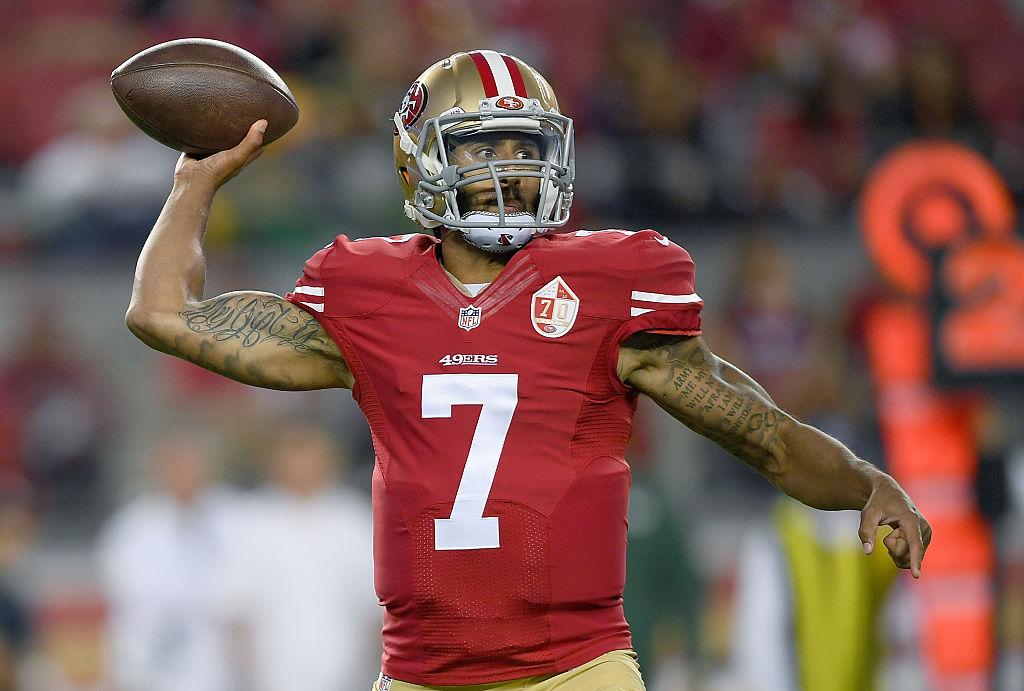President Obama backs Colin Kaepernick in national anthem row: ‘It’s his constitutional right to protest'
The president was asked about NFL star during a press conference at the G20

Your support helps us to tell the story
From reproductive rights to climate change to Big Tech, The Independent is on the ground when the story is developing. Whether it's investigating the financials of Elon Musk's pro-Trump PAC or producing our latest documentary, 'The A Word', which shines a light on the American women fighting for reproductive rights, we know how important it is to parse out the facts from the messaging.
At such a critical moment in US history, we need reporters on the ground. Your donation allows us to keep sending journalists to speak to both sides of the story.
The Independent is trusted by Americans across the entire political spectrum. And unlike many other quality news outlets, we choose not to lock Americans out of our reporting and analysis with paywalls. We believe quality journalism should be available to everyone, paid for by those who can afford it.
Your support makes all the difference.He claimed - not very convincingly - that he had not been paying much attention to a controversy that had divided his country.
But then President Barack Obama launched into a staunch, nuanced defence of American football player Colin Kaepernick’s refusal to stand for the national anthem - a protest over the way minorities are often treated in the US.
“My understanding is that he is exercising his constitutional right to make a statement, and there is a long history of sports figures doing do,” he said. “There are a lot of ways you can do it.”

He added: “As a general issue, when it comes to the flag and the national anthem and the meaning that holds for our men and women in uniform, and those who fought for us, that is a tough thing for them to get past, and then hear what his deeper concerns are."
“But I don’t don’t doubt his sincerity based on what I have heard. I think he cares about some real, legitimate issues that need to be talked about. And if nothing else, what he has done is generate more conversation around topics that need to be talked about.”
Kaepernick, the quarterback with the San Francisco 49ers, has been at the centre of an impassioned debate since he began refusing to stand for the national anthem before games. He has done so to draw attention to the discrimination frequently faced by black people and other minorities in the US.
“I am not going to stand up to show pride in a flag for a country that oppresses black people and people of colour,” Kaepernick said in an interview with NFL Media. “To me, this is bigger than football and it would be selfish on my part to look the other way. There are bodies in the street and people getting paid leave and getting away with murder.”
The NFL has said that “players are encouraged but not required to stand during the playing of the national anthem.” The 49ers has issued a statement saying that Americans have the right to protest or support the anthem.
“The national anthem is and always will be a special part of the pregame ceremony,” the team said. “It is an opportunity to honour our country and reflect on the great liberties we are afforded as its citizens. In respecting such American principles as freedom of religion and freedom of expression, we recognise the right of an individual to choose to participate, or not, in our celebration of the national anthem.”
Yet Kaepernick’s move has sparked outcry among many, who claim he is being disrespectful. A number of military veterans have condemned his actions, while at the same time other military personnel have said they are serving to protect liberties that include free speech.
Among those to criticise him was Republican candidate Donald Trump. “I think it’s personally not a good thing, I think it’s a terrible thing,” said Mr Trump. “And, you know, maybe he should find a country that works better for him. Let him try, it won’t happen.”
Mr Obama, speaking after his final G20 meeting, in Hangzhou, said he had spoken in the past of his wish for a “an active citizenry”.
“Sometimes that’s messy and controversial and it gets people angry and frustrated. But I would have young people who are engaged in the argument and trying to think through how they can be part of our democratic process, than people who are just sitting on the sidelines and not paying attention at all,” he said.
“My suspicion is that over time, he is going to refine how he’s thinking about it. Maybe some of his critics will see starting seeing that he has a point about certain concerns about justice and equality. That is how we move forward. Sometimes it’s messy, but that’s the way democracy works.”
The Associated Press said that Kaepernick was not the first US-based athlete to use the anthem for protest.
In 1996, basketball player Mahmoud Abdul-Rauf refused to stand for the anthem, saying the United States had a history of tyranny and doing so would conflict with his Islamist beliefs.
The NBA initially suspended Abdul-Rauf for his stance before it was lifted when he said he would stand and pray silently during the song.
Kaepernick has said he is not worried about any potential fallout from his protest.
“This is not something that I am going to run by anybody,” he said. “I am not looking for approval. I have to stand up for people that are oppressed. If they take football away, my endorsements from me, I know that I stood up for what is right.”
Join our commenting forum
Join thought-provoking conversations, follow other Independent readers and see their replies
Comments